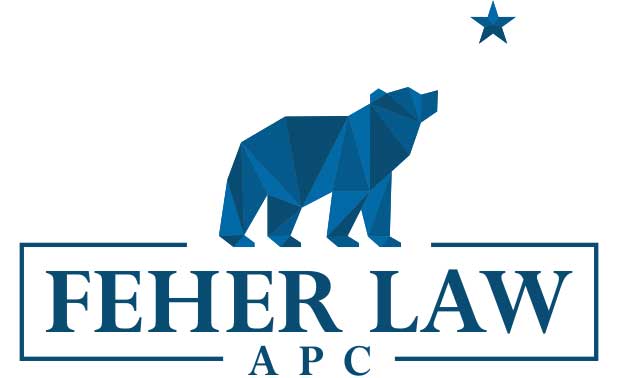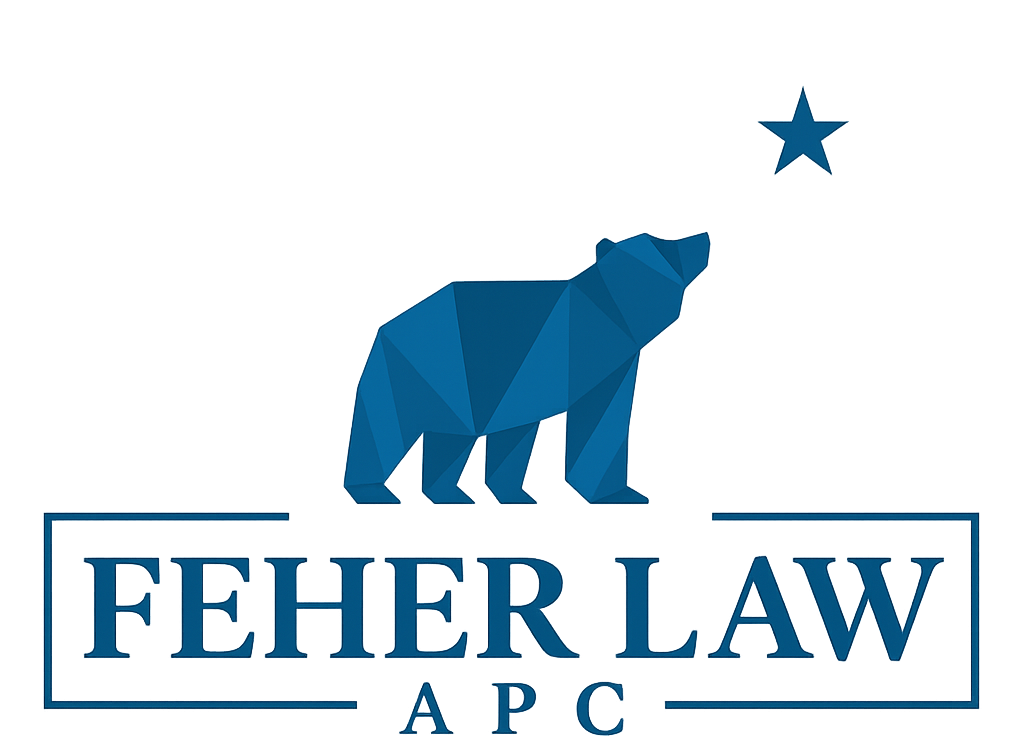Personal Injury Lawyer Cost in California

Personal injury lawyers in California typically charge 33-50% contingency fees, meaning you pay nothing unless you win.
At Feher Law, our personal injury lawyer costs match this industry standard, ranging from approximately 33% for pre-litigation cases to 45-50% when cases proceed to trial, with case expenses varying from as little as $250 for simple matters to over $100,000 for complex trials. You owe no upfront costs, and if we don’t win, you don’t pay attorney fees.
Our team has recovered over $100 million for clients across California. We understand that transparent cost information helps you make informed decisions during one of life’s most challenging times.
Contact our Torrance personal injury lawyer now to learn how our team can fight for your recovery.
What is a Contingency Fee?
A contingency fee means your attorney gets paid only when you receive compensation. This arrangement removes financial barriers to justice for injury victims who can’t afford hourly legal fees.
⚖️ Here’s how it works: if you don’t win your case, you don’t owe attorney fees. Your lawyer assumes the financial risk of pursuing your claim, which aligns our interests with yours from day one.
Most California personal injury lawyers structure their fees based on the case stage. Pre-litigation cases typically cost approximately 33% of your recovery. Once your case enters formal litigation with court filings and discovery, the fee increases to approximately 40-45%. If your case proceeds to arbitration or trial, expect fees of around 45-50%.
The percentage increase reflects the substantially greater work required as cases advance. Litigation demands depositions, extensive discovery, expert witness preparation, and trial readiness—all requiring significant attorney time and resources.
These percentages represent industry standards across California. While some negotiation is possible, particularly for straightforward cases likely to settle quickly, most reputable firms maintain consistent fee structures based on case complexity and stage.
Our team will explain your fee agreement clearly before you sign anything, ensuring you feel confident about the financial arrangement from the start.
Contact our experienced team at (866) 646-6676 to discuss your case today.
How Much Do Personal Injury Lawyers Charge in California?
In California, our personal injury attorneys typically earn 33% to 50% of your final settlement or damages, depending on the stage and complexity of your case.
Standard fee structures break down by case progression:
- Pre-litigation (before lawsuit filing): Approximately 33% of settlements
- Litigation (after filing but before trial): Typically 40-45% of settlement or verdict
- Trial and arbitration: Generally, 45-50% the verdict
The State Bar of California regulates attorney fees to prevent unconscionable charges. While California doesn’t mandate specific percentage caps like some states, attorneys must provide written fee agreements and cannot charge fees that exceed what they recover for you.
For context, hourly billing requires payment upfront and can range from $200 to $500 per hour, depending on the lawyer’s experience. Over months or years, those fees can total $50,000 to $200,000+ — costs most injury victims cannot manage while already facing medical bills and lost income.
With contingency fees, you never pay upfront and owe nothing unless we win.
📌 We’ve secured significant results for our clients, including a $22,762,145.85 bench verdict in an elder abuse case in Los Angeles, a $14.6 million verdict for a bicycle crash victim in Orange County, and a $9 million settlement for a motorcycle crash case in Orange County. These results demonstrate how contingency fee arrangements provide clients with access to the caliber of representation necessary for achieving maximum recovery.
We’ll walk you through exactly what to expect with our fee structure during your free consultation so that you can make an informed decision about your representation.
Use our personal injury attorney fee calculator below to get a ballpark figure for how much your case might be worth, and what the attorney fee might look like based on your recovery.
Note: Calculator results are estimates only and do not guarantee specific outcomes in your case. Actual fees and expenses vary based on individual circumstances.
Selected Value: 0%
Selected Value: 33%

Are There Upfront Costs to Hire a Personal Injury Lawyer?
No upfront fees or retainers are required when you hire our California personal injury lawyers. We advance all case costs and only recover them if we win your case.
This no-risk approach removes financial barriers during your most vulnerable time. While you focus on medical recovery, we handle every expense necessary to build a strong case.
Case expenses we typically advance include:
- Medical records: $10–25 per set from each provider
- Insurance policy runs
- Court filing fees: (several hundred dollars when filing lawsuits)
- Investigation costs: private investigators, accident reconstruction specialists
Depositions: experts, doctors, engineers, life-care planners (including court reporters, videographers, and transcripts that can reach several thousand dollars) - Expert witness consultations (charged in full)
- Trial testimony: half-day or full-day rates plus travel (trial doctors do not discount their fees, unlike treating medical providers)
📌 Pre-litigation cases often settle before a lawsuit is filed, so expenses are minimal. At this stage, costs are usually limited to obtaining medical records, ordering police reports, and conducting basic research to establish liability and damages.
Trial cases present dramatically different cost profiles. Complex litigation requiring multiple expert witnesses, extensive depositions, and trial preparation can exceed $100,000 in expenses. However, case economics guide our investment decisions—we won’t spend $100,000 chasing a $15,000 policy limit.
Most medical providers treating personal injury victims work on liens, meaning they defer payment until your case resolves. You typically face minimal out-of-pocket medical costs during treatment, though you may pay standard co-pays or deductibles if using health insurance for services like physical therapy.
The California Courts system provides resources on court procedures throughout the state, but these processes often require significant costs for investigation, experts, and evidence. Our firm advances these expenses for you, so you never have to worry about how to pay for them while we build your case.
Learn how we can help you without any upfront costs—call (866) 646-6676 for a free consultation in English or Spanish.
What Factors Affect Personal Injury Attorney Fees?
Several key factors influence what you’ll ultimately pay your personal injury attorney. Case complexity, policy limits, and whether your case goes to trial all play significant roles.
💡 Scenario 1: Straightforward liability with limited damages
A driver is rear-ended at a stoplight in Torrance. The at-fault driver’s liability is clear, and the insurance policy limit is $15,000. The case settles quickly in pre-litigation with minimal expenses. Summary: straightforward liability, capped damages, low costs.
💡 Scenario 2: Complex case requiring trial
A patient suffers a life-altering injury due to a surgical error in Los Angeles. Multiple experts are needed to testify about the long-term impact on the patient’s quality of life, supported by healthcare research. The defendant’s high policy limit justifies advancing $50,000+ in trial preparation costs. Summary: complex case, high damages, trial-level costs.
The geographic location within California can influence costs. Major metropolitan areas like Los Angeles, San Francisco, and San Diego typically have higher expert witness fees and deposition costs compared to smaller cities. However, these areas also tend to generate higher jury verdicts, often justifying the increased investment.
The extent and severity of your injuries directly correlate with case complexity and cost. Catastrophic injuries requiring permanent care need extensive medical documentation and expert testimony about future needs—substantially increasing case expenses beyond soft tissue injuries that fully resolve.
| Case Type | Typical Timeline | Average Expenses | Common Expert Needs |
| Minor soft tissue (small policy) | 6–12 months | $250–$2,500 | Medical records review |
| Moderate injury (larger policy) | 12–18 months | $5,000–$25,000 | Medical experts, accident reconstruction |
| Catastrophic injury | 2–4+ years | $50,000–$150,000+ | Multiple medical specialties, life care planners, and economists |
| Wrongful death | 2–5+ years | $75,000–$200,000+ | Medical experts, economists, and vocational specialists |
We’ll assess your specific situation and explain what level of investment your case will likely require, giving you realistic expectations from day one.

How Long Does it Take to Resolve a Personal Injury Case?
Case timelines vary significantly based on injury severity, policy limits, and whether litigation becomes necessary.
Pre-litigation settlements represent the fastest resolution path. When liability is clear and injuries well-documented, insurance companies often negotiate reasonable settlements without formal lawsuits. Cases involving policies of $15,000-$30,000 typically resolve within 6 months from the date we take your case.
Higher-value cases naturally require longer timelines. Cases with policy limits around $100,000 or more generally take closer to 12 months to resolve, as treatment takes time and insurance companies scrutinize larger claims more carefully.
⚠️ Litigation dramatically extends case duration. Once we file a lawsuit, the discovery process begins—depositions, written interrogatories, document requests, and expert witness preparation. Courts across California face significant backlogs, with some cases filed in 2020 still pending trial today.
The Los Angeles Superior Court and other California trial courts provide information about case processing and court procedures. These delays, while frustrating, often work in our clients’ favor as insurance companies face mounting defense costs and trial uncertainty.
Your medical treatment timeline also affects case duration. We cannot fully evaluate your claim until you reach maximum medical improvement—the point where your condition stabilizes. Rushing a settlement before understanding the full extent of your injuries often leaves money on the table.
Settlement disbursement adds another 30-120 days after reaching an agreement. Settlement agreements must be drafted, reviewed by all parties, signed, and then processed for payment. During this period, we aggressively negotiate medical liens to reduce your bills and maximize your net recovery.
Our team manages every deadline and keeps you informed throughout the process, so you always know where your case stands and what to expect next.
Our team handles every detail while you focus on recovery—contact us at (866) 646-6676.
What Happens to My Settlement Money?
When your case resolves, several deductions occur before you receive your net recovery. Settlement funds first pay your attorney’s contingency fee based on your agreement.
Case expenses we advanced—medical records, expert witnesses, court costs—are then reimbursed from the remaining funds.
Medical liens represent the next deduction. Healthcare providers who treated you often have legal rights to repayment from your settlement. These include hospital bills, surgery costs, physical therapy, and specialist consultations.
We aggressively negotiate these medical liens as standard practice. Hospitals and medical providers frequently agree to substantial reductions, sometimes accepting significantly less than the original bills. This negotiation directly increases your net recovery—money that stays in your pocket.
Health insurance liens can also apply if your insurer paid medical bills related to your accident. Federal programs like Medicare and Medi-Cal have strict repayment requirements that must be satisfied from your settlement. The California Department of Health Care Services administers Medi-Cal and provides information about the program.
Our relationships with medical providers who treat on liens give clients significant advantages. These doctors provide treatment with payment deferred until case resolution and often reduce final bills substantially. This approach minimizes your out-of-pocket costs during treatment and maximizes your final recovery.
✔️ We provide detailed accountings showing exactly how settlement funds are distributed, walking you through every line item so you see precisely where your money goes.
Do I Pay Attorney Fees If I Lose My Case?
No, you do not pay attorney fees if your case is unsuccessful under a contingency fee arrangement. Our attorney assumes the financial risk, collecting fees only when you receive compensation.
This risk-free structure explains why contingency fees exist. Attorneys carefully evaluate cases before acceptance, taking only claims with reasonable prospects of success. We invest our time and resources with no guaranteed return, motivated by confidence in achieving positive outcomes.
However, case expenses present a different consideration. Some law firms require clients to reimburse case costs even if they lose, while others absorb these expenses entirely. Our firm covers case costs upfront, and clients typically only repay expenses from successful recoveries.
Written fee agreements must clearly specify expense responsibility in unsuccessful cases. State Bar regulations require attorneys to explain all potential costs and fee arrangements before you sign anything.
Our firm’s track record includes a $4.4 million scooter accident settlement in Los Angeles and a $5 million slip and fall verdict in Van Nuys. We invest in cases we believe in, and this selective approach protects both our clients and our firm.
Ready to protect your rights and pursue the compensation you deserve? Contact our San Bernardino Personal Injury Lawyer today for your risk-free consultation.
Can Personal Injury Attorney Fees Be Negotiated?
Yes, contingency fees are sometimes negotiable, particularly for straightforward cases with clear liability and quick settlement potential. We welcome your questions about fees so you feel comfortable and fully informed before moving forward.
Your negotiating leverage increases when multiple attorneys want your case. If you receive proposals from several qualified firms, you can compare fee structures and terms. However, never choose representation based solely on the lowest fee; attorney experience, resources, and track record matter far more to your final recovery.
Some attorneys offer graduated fee structures where percentages change based on recovery amounts. These arrangements can benefit clients in high-value cases while fairly compensating attorneys for their work.
Be cautious of attorneys promising unusually low fees. Quality representation requires substantial investment in case development, expert witnesses, and trial preparation. Attorneys cutting corners on fees may cut corners on your case.
Fee negotiations should occur during initial consultations before you sign any agreements. Once you’ve signed a fee agreement and the attorney has begun work on your case, changing terms becomes significantly more difficult.
We secured a $14.6 million verdict for a bicycle crash victim with spinal injuries in Orange County. Cases involving serious injuries and substantial damages require extensive resources that contingency fee structures make accessible to all clients regardless of financial means.
✔️ Our team will discuss all fee options openly during your consultation and ensure you’re comfortable with the arrangement before moving forward.

How Do Contingency Fees Compare to Hourly Billing?
Hourly billing often prices victims out of justice. It requires large retainers and ongoing payments regardless of outcome, with costs easily reaching six figures in long cases. Contingency fees remove that barrier by eliminating upfront payments and tying attorney compensation directly to your recovery.
Consider the financial impact:
| Billing Method | Upfront Payment | Monthly Costs | Total Cost (2-year case) | Client Pays if They Lose |
| Hourly ($300/hr average) | $5,000–$10,000 retainer | $3,000–$8,000+ | $75,000–$200,000+ | Yes, full amount |
| Contingency (33–40%) | $0 | $0 | 33–40% of recovery only | $0 in attorney fees |
Contingency arrangements also align the attorney and client interests. When we only get paid if you win, we’re motivated to maximize your recovery. Hourly billing creates no such alignment—attorneys get paid the same whether you win or lose.
Risk distribution represents another key difference. With contingency fees, attorneys assume all financial risk of unsuccessful cases. With hourly billing, clients pay regardless of outcome, potentially losing tens of thousands with no compensation for their injuries.
The quality of representation often increases under contingency models. Attorneys working on contingency invest substantial resources into cases because their payment depends on results.
Our firm’s results speak to the effectiveness of contingency representation. We’ve secured a $2.8 million verdict for a traumatic brain injury case in Sacramento and a $2.7 million verdict for a sexual assault case in Van Nuys. These outcomes reflect our commitment to investing fully in cases we accept.
✔️ Key takeaway: Hourly billing means paying whether you win or lose. Contingency fees mean no upfront cost, no fees if you lose, and aligned incentives—your lawyer only gets paid if you recover.
What Additional Expenses Should I Expect?
Personal injury cases involve expenses beyond attorney fees, but you won’t pay these out of pocket. Our firm advances all case costs and only recovers them if we win. Typical expenses may include medical records, expert witnesses, depositions, investigation costs, and court filing fees.
For most clients, the answer to out-of-pocket costs is “none.” We cover the case expenses, and many medical providers treat on liens, meaning they’re paid only after settlement. If you choose to use your health insurance, the only out-of-pocket expenses you might face are small co-pays or deductibles for things like physical therapy or chiropractic care.
📌 Bottom line: You should expect us to handle the financial side of case preparation, while you focus on your recovery.
Most clients won’t face these expenses directly, but it helps to understand what they look like in practice:
- Expert witnesses – Fees vary by specialty; initial reviews can cost thousands, with depositions and trial testimony adding more. Unlike treating doctors, experts rarely discount their rates.
- Court costs – Filing fees typically run a few hundred dollars, while depositions require paying court reporters, videographers, and transcripts.
- Investigations – Private investigators, witness interviews, and accident reconstructions are billed hourly.
- Trial preparation – Developing exhibits, enlarging photos, or preparing multimedia presentations can be substantial in complex cases.
📌 These costs are advanced by our firm, and we only spend strategically when they add real value to your recovery.
Let us handle all case expenses while you focus on healing—call (866) 646-6676 today.
How Does Medical Lien Negotiation Affect My Recovery?
Medical lien negotiation directly impacts how much money you ultimately receive from your settlement. Aggressive lien reduction increases your net recovery, sometimes by tens of thousands of dollars.
Medical liens give healthcare providers legal rights to repayment from your settlement. Hospitals, doctors, physical therapists, and other medical professionals treating your accident-related injuries can place liens, ensuring payment when your case resolves.
Our firm negotiates these liens as standard practice, not as an extra service. Many attorneys fail to aggressively pursue lien reductions, leaving significant money on the table. We’ve built strong relationships with medical providers throughout California who understand that reasonable lien resolution benefits everyone.
Hospital liens often provide the greatest reduction opportunity. Emergency room visits and hospital stays generate enormous bills, but hospitals frequently accept reduced amounts when we negotiate. A substantial hospital bill might be reduced significantly through effective negotiation.
Treating physicians who work on liens typically reduce their bills post-settlement. These doctors understand the personal injury process and often accept reductions from their original charges. This reduction increases your net recovery while ensuring doctors receive fair compensation.
Health insurance liens require careful handling. Private health insurance companies increasingly assert subrogation rights—claiming repayment for medical benefits they provided.
Government program liens like Medicare and Medi-Cal carry strict federal repayment requirements with limited negotiation flexibility. However, our experienced attorneys know strategies for reducing even these liens when possible.
We secured a $3.6 million verdict for a slip and fall case involving broken wrist and head injury in Los Angeles. Large verdicts like this require careful lien resolution to maximize what clients take home.
The timing of lien negotiation matters. We begin this process early, maintaining communication with lien holders throughout your case. This proactive approach often yields better results than last-minute negotiation when settlement funds arrive.
✔️ Our team fights to reduce every dollar of medical debt we can, putting more money back in your pocket where it belongs.
What Makes Feher Law Different in Handling Costs?
Our approach to case costs and fees prioritizes your financial recovery above all else. We’ve recovered over $100 million for clients by combining aggressive representation with strategic cost management.
We advance all case expenses without requiring upfront payment. Medical records, expert witnesses, investigation costs, court fees—we cover everything necessary to build the strongest possible case. You focus on medical recovery while we handle the financial investment.
Medical lien negotiation represents a core strength that directly benefits your bottom line. We’ve cultivated relationships with medical providers throughout California who treat clients on liens and reduce bills post-settlement. This network ensures you receive quality care without immediate payment pressure.
Strategic cost management guides every expense decision. We won’t spend $100,000 chasing a $15,000 policy limit. Instead, we carefully evaluate case economics, investing appropriately based on potential recovery while always protecting your interests.
Our trial capability means cases stay with one firm from start to finish. Many firms accept cases but refer them elsewhere when litigation becomes necessary. This handoff often costs clients money and continuity. We handle cases through trial, ensuring consistency and eliminating referral fees that reduce your recovery.
Clients truly become an extension of our family during representation that often spans years. This personal approach means we’re invested not just financially but emotionally in achieving the best possible outcome for you. Our founders’ commitment to integrity and client-centered service permeates every aspect of our practice.
We offer free consultations in both English and Spanish, ensuring language never creates barriers to justice. Our multilingual support means you fully understand every aspect of your case, including all costs and fees.
Transparency guides our fee practices. You’ll receive written fee agreements clearly explaining all percentages and potential costs before signing anything. We answer every question about fees honestly and completely—no surprises later.

Your Rights When Hiring a Personal Injury Attorney
California law provides strong protections for clients hiring personal injury attorneys. The State Bar requires attorneys to provide written fee agreements explaining all costs, percentages, and terms before representation begins.
You have the right to negotiate fee terms before signing any agreement. While many firms maintain standard rates, discussing fees openly during consultations is not only acceptable but encouraged. Never feel pressured to sign immediately—take time to review agreements and ask questions.
Clients can terminate attorney representation at any time if dissatisfied with service, communication, or case handling. However, your original attorney may still be entitled to payment for work completed, typically calculated from eventual settlement proceeds. California courts oversee fee disputes between clients and terminated attorneys to ensure fairness.
📌 Attorneys must maintain clear communication about case progress and expenses. You’re entitled to regular updates, prompt responses to inquiries, and detailed accountings of all costs advanced on your behalf. Poor communication or unexplained expenses may violate professional conduct rules.
The State Bar investigates complaints about unethical billing practices, fee disputes, or other attorney misconduct. If your attorney charges fees without providing written agreements, adds unexplained costs, or engages in other questionable practices, you have recourse through State Bar disciplinary procedures.
Fee arrangements must be “conscionable”—meaning reasonable under the circumstances. While California doesn’t cap personal injury contingency fees like some states, attorneys cannot charge fees exceeding what they recover for you or otherwise unreasonable amounts. Courts review disputed fees and can reduce unconscionable charges.
You’re entitled to copies of all documents in your case file. This includes medical records, correspondence, court filings, and expense receipts. If you terminate representation, your attorney must promptly provide your complete file to you or your new attorney.
✔️ At our firm, your rights are more than legal requirements—they’re the foundation of how we work with every client. We provide written agreements that are clear and transparent, advance all case costs, and keep you updated at every step. Our lawyers encourage questions, explain fee structures openly, and never pressure you into decisions before you’re ready.
Let Feher Law Guide You Through Your Personal Injury Case
Personal injury cases involve complex cost considerations, but you don’t navigate them alone. We treat every client as an extension of our family, handling financial details so you can focus on recovery.
We’ve recovered over $100 million for California clients through transparent, client-focused representation. From the initial free consultation through final settlement disbursement, we’re with you every step. You’ll never hire another firm as your case progresses—we’re full-service from start to finish.
Our contingency fee structure means no upfront costs and no attorney fees unless we win. We advance all case expenses and aggressively negotiate medical liens to maximize your net recovery. This approach removes financial barriers and aligns our interests completely with yours.
Every case begins with understanding your unique situation. We evaluate liability, damages, insurance coverage, and case economics before recommending the best path forward. This analysis ensures realistic expectations and strategic planning from day one.
Call us today at (866) 646-6676 or contact us online for your free consultation. Let us show you how we can help you secure the compensation you deserve.
FAQs
Can I Switch Attorneys If I'm Unhappy With My Current Lawyer's Fee Structure?
Yes, you can change attorneys at any time during your case, though your original lawyer may be entitled to payment for work already completed. California law protects your right to terminate representation if you’re dissatisfied with fees, communication, or case handling. The original attorney typically receives compensation based on the work performed, calculated as either a percentage of the eventual settlement or quantum meruit (reasonable value of services rendered).
Courts often resolve fee disputes between departing and incoming attorneys to ensure fair allocation.
What Happens If My Case Settles Very Quickly? Do I Still Pay The Full Contingency Fee?
Your fee agreement determines payment regardless of settlement timeline, so quick resolutions typically still trigger the full agreed-upon percentage. Some attorneys offer sliding-scale fees where percentages decrease for early settlements, but this must be specified in your written agreement beforehand.
Even cases settling within weeks often require substantial attorney work—investigation, records review, demand preparation, and negotiation—justifying the contingency fee. If you believe a quick settlement warrants fee discussion, raise this during initial consultations before signing any agreements.
Will My Attorney Fee Percentage Increase If The Insurance Company Appeals The Verdict?
Most fee agreements address post-trial proceedings, often increasing the contingency percentage if appeals become necessary. Appeals require additional substantial work—briefing, oral arguments, and potentially years of continued litigation. Your written fee agreement should clearly state whether and how fees change during appeals.
Some attorneys maintain the trial percentage through appeals, while others increase fees to account for extended representation. Always clarify appeal fee structures before the trial begins to avoid surprises.
Do I Pay More If My Personal Injury Case Involves Multiple Defendants?
Multiple defendants don’t automatically increase attorney fees beyond standard contingency percentages, though case complexity might influence which percentage tier applies. Cases involving several defendants typically require more extensive investigation, depositions, and legal strategy, potentially pushing cases into litigation faster.
Your attorney’s fee remains the agreed-upon percentage of total recovery regardless of how many parties contributed to that recovery. However, complex multi-defendant cases might incur higher expenses for additional expert witnesses, depositions, and discovery responses.
Can Medical Providers Refuse To Reduce Their Liens Even If My Attorney Negotiates?
Yes, medical providers can refuse lien reductions, though most negotiate when presented with reasonable offers and clear case circumstances. California law gives healthcare providers lien rights, but doesn’t mandate that they accept reduced payment. However, providers often reduce bills, understanding that aggressive lien enforcement might leave patients with nothing, damaging provider-patient relationships and reducing future business.
Attorneys experienced in lien negotiation at Feher Law know which providers typically cooperate and how to present compelling reduction arguments. When providers refuse negotiation, settlement proceeds must cover full lien amounts before you receive the remaining funds.
Related Posts

Driver Flees After East Hollywood Crash

Olympic Crash Nearly Costs Lindsey Vonn Her Leg

If Someone Brake Checks You, Who’s at Fault in California?

One Injured in LA Car Collision on SR 60

How Long Does a Retaliation Lawsuit Take?



